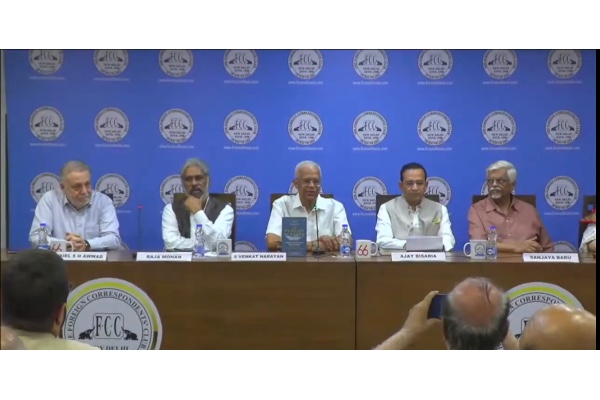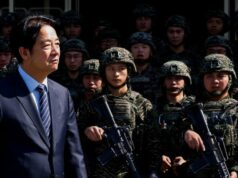NEW DELHI: “Even though the rules of engagement have changed, it does not mean we have stopped engaging with Pakistan,” former high commissioner to Islamabad Ajay Bisaria told a packed auditorium at the Foreign Correspondents Club in Delhi on Tuesday. “We keep engaging on three tracks: through our missions, military-military and intelligence agencies. It’s just that we don’t have a structured dialogue going.”
He was speaking at a discussion on “In Pursuit of Peace: India-Pakistan Relations Under Six Prime Ministers,” a book by the late diplomat Satinder Kumar Lambah –who was also former Prime Minister Manmohan Singh’s Special envoy for Afghanistan and Pakistan (2005 and 2014).
Bisaria spoke about his association with Lambah, and how his inputs had helped broker a semblance of peace between the two countries following the Agra summit and the SAARC summit of 2004 where Musharraf and Vajpayee worked out a joint statement, in which the former pledged not to host anti-India elements on Pakistani soil.
The four points that Lambah stressed in the book, (which reportedly involved Demilitarization or phased withdrawal of troops, no change of borders but allowing Kashmiris to move freely across the Line of Control, self-governance without independence and joint supervision of the state by India, Pakistan and Kashmir) he said, were in many ways ahead of its time, because “we needed to build some trust, before we could have that conversation about making borders irrelevant. That seems fairly impractical today, but the question really is whether they can be frozen or unfrozen at a time when we are able to build that trust to take the relationship forward.”
Writer and commentator Sanjaya Baru, said the four-point formula were originally proposed by Manmohan Singh in a speech at Amritsar. Disagreeing that these ideas were ahead of its time, he said that today the “times have changed, and it appears no longer feasible, because the relationship had deteriorated over the last 10 years, and that makes these ideas seem ahead of their time.” He said every time there was a terror attack, there was an appeal for calm by Prime Minister Manmohan Singh to “keep temperatures low in order to take these discussions forward.”
Describing India Pakistan relations as one that was marked by missed opportunities, both big and small, Raja Mohan referred to talks between prime ministers Rajiv Gandhi and Benazir Bhutto, Narasimha Rao and Nawaz Sharif, Manmohan Singh and subsequently Atal Bihari Vajpayee and Pervez Musharraf, and noted that the two sides had come very close to agreements on Siachen, Sir Creek, and trade, including a 40-km pipeline which exported oil from India to Pakistan, and the possibility of selling surplus power to Pakistan. But they were all scuttled at the last moment.
“I think the Modi government came to power with the clear sense that the terms of engagement with Pakistan must be altered,” he said. “It cannot be a framework in which India would make concessions, or that the status of Kashmir is open ended, and that India must make concessions on Kashmir in order to have peace with Pakistan.”
However, within this framework, “there was room for engagement. Mr Modi went to Lahore at three hours notice to meet Prime Minister Nawaz Sharif, whose granddaughter was getting married. So there was this boldness in reaching out while at the same time, making clear that the old framework does not apply anymore.”
However, he said he was optimistic about peace, because one, most of the issues had been discussed threadbare and almost resolved earlier before they were walked back, two, there were reports that former Prime Minister Nawaz Sharif, who was. known for his attempts at peace and trade with India, was returning to Pakistan from exile, and three, the global context had fundamentally changed, with the support that Pakistan used to enjoy from the US and Muslim nations waning radically, with China now their only key supporter. So even the minimal attempts at reconciliation would pave the way and give both nations the scope and space to resolve larger issues, “but on terms that are fundamentally different.”
Bisaria said there was a clear consensus in India that Kashmir was no longer linked to India’s Pakistan policy. When asked by this correspondent whether the main roadblock to peace between India and Pakistan was the Pakistani army which feared losing its power and massive budget, Bisaria said that was not always true. Former Army Chief General Qamar Javed Bajwa had wanted peace with India, but was overruled by a civilian Prime Minister, Imran Khan.
However, “who India should talk to in Pakistan has been a policy dilemma in India for the past 75 years…But the army continues to be a very important element of the Pakistani power structure, although it’s policy towards India can change from chief to chief, and we must keep our channels of communication with it open.”
Related stories:
https://bharatshakti.in/pakistans-multiple-crises-become-breeding-ground-for-heightened-faith-driven-terror-attacks/
In a career spanning three decades and counting, Ramananda (Ram to his friends) has been the foreign editor of The Telegraph, Outlook Magazine and the New Indian Express. He helped set up rediff.com’s editorial operations in San Jose and New York, helmed sify.com, and was the founder editor of India.com.
His work has featured in national and international publications like the Al Jazeera Centre for Studies, Global Times and Ashahi Shimbun. But his one constant over all these years, he says, has been the attempt to understand rising India’s place in the world.
He can rustle up a mean salad, his oil-less pepper chicken is to die for, and all it takes is some beer and rhythm and blues to rock his soul.
Talk to him about foreign and strategic affairs, media, South Asia, China, and of course India.





